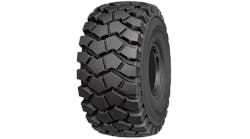Goodyear Tire & Rubber Co.’s 2006 decision to discontinue production of certain private brand tires represented a seismic shift for a segment of the market that has traditionally enjoyed a high degree of supplier-customer consistency and predictability.
By taking millions of units out of circulation and effectively mothballing a number of brands, including long-established labels like Winston and Remington, Goodyear inexorably altered the North American private brand tire landscape.
Some private brand marketers suddenly were forced to find new suppliers. Non-Goodyear private brand marketers weren’t immune to the fallout either. Many began to re-evaluate relationships with their existing suppliers. Others considered sourcing tires from less traditional points of origin for the first time.
One thing was clear: In the private brand tire segment, the term “business as usual” no longer applied.
Eggs in many baskets
By ramping down its private brand production, Goodyear fell in line with what some of its competitors had already done. Michelin North America Inc. had taken similar actions years before. And by 2006, Bridgestone Firestone North American Tire LLC (now Bridgestone Americas Tire Operations) certainly was not the private label force it had been in years past.
But Goodyear’s action had significant repercussions. The company had been St. Peters, Mo.-based SURE Tire Co.’s primary supplier for many years. In the post-exit shake-out, SURE lost the popular Remington brand, which was one of its marquee lines (and the “R” in the “SURE” acronym).
It was a tense time, says SURE Tire President Pat McLaughlin. “There were some people who thought SURE would be out of the picture.”
While SURE Tire had been sourcing products from other suppliers, notably Maxxis, it had to fill the void left by Goodyear. (The company currently has three brands: Summit, Heritage and Kreed.) It wound up taking on Cooper Tire & Rubber Co. as a supplier. Greenball Corp. also builds tires for SURE.
“One thing we’ve strategically done is not marry ourselves to any one manufacturer.”
Since then, McLaughlin reports that SURE Tire’s sales have grown and remain on an upward trajectory.
“We’ve invested millions of dollars in new molds and designs. We’re very happy with the way we’ve been able to develop our relationships with these manufacturers. We feel like we have a very good footprint.”
American Tire Distributors Inc. (ATD) is another company that had to re-tool its private brand strategy after losing its Winston brand in the wake of Goodyear’s decision.
To compound matters, around the same time, the company also lost its Regul private label product, which had been made by Michelin.
“Both were essentially discontinued,” says Ron Sinclair, ATD senior vice president of marketing. “It wasn’t our decision. We were selling significant quantities in both brands.”
Up until late last year, ATD offered one private brand, Dynatrac, a medium truck tire.
The company’s portfolio expanded when ATD acquired AM-PAC Tire Distributors Inc. near the end of December. In addition to giving ATD 24 new distribution centers and a built-in retail franchise program, the deal gave the Huntersville, N.C.-based distribution juggernaut two additional private brands, Capitol and Negotiator.
Both are passenger and light truck tire-only lines. “They’re really focused brands.”
ATD is positioning Negotiator as a “fourth tier, opening price point” product, according to Dan Seitler, ATD senior vice president of procurement. “We see Capitol as being a value line. Our intent is to fill it out to be a complete passenger and light truck offering, which may include other products, like trailer tires.”
ATD sources both brands from offshore factories. (Sinclair and Seitler declined to identify the plants.) “We’ve been able to solidify additional supply,” notes Sinclair. “At the end of the day, if you have a brand but don’t have consistent supply, you’re going to fail.”
He says ATD has picked up where AM-PAC left off in developing the brands. “It’s an inbound container program for us. But our ability to bring that product in, mix it through our centers and deliver it in fours, eights and twelves to our dealers at very competitive price points... it’s the value offering we’re able to bring.”
Buying advantage
Amarillo, Texas-based A to Z Tire & Battery Inc. has sold private brand tires since the early 1970s, when it started carrying the National brand, which is now owned by Del-Nat Tire Corp. In 1974, the dealership helped launch the Summit brand. A to Z Tire still carries both brands, plus Akuret and several other private labels.
Manufacturing switches in the private brand segment are nothing new, according to A to Z Tire President Phil Nussbaum. However, he says the big difference now vs. then is that there are fewer domestic supply options today.
“If you go back 25 years ago, you could go to one manufacturer that made 95% of what you needed.” Sourcing from a single supplier also yielded pricing advantages, he says.
“You really can’t go to one source that can fill everything you need anymore because nobody wants to manufacture all the different kinds of tires. You have to buy from multiple sources. And then to have the advantage in pricing that a private or associate brand would have over a house brand, you have to buy it better. Most of the time that means you have to buy containers. You have to be a volume-type buyer.”
Over the years, A to Z Tire has been forced to change manufacturers “several times.” Years ago, domestic tire manufacturers, in order to lower their production costs, would try to build more products, and would use private brands to boost their plants’ capacities to 100%, he explains.
“The domestic manufacturers have really changed their philosophy. If they can’t get up to 100% production, they shut down their factories. What happens when they do that, of course, is that more production goes overseas.
“Manufacturers in China and other places in the world are doing the same thing we did 20 or 30 years ago, which is to try to run their factories at 100% capacity and then try to sell out their capacity.”
In a roundabout way, this has restored pricing advantages to private brand marketers and distributors, he says.
A to Z Tire sells private brands at both the wholesale and retail levels. “At the retail level, we try to price our products about the same as the other major retail chains. We don’t want to be seen as a price cutter, but we are competitive.”
On the wholesale side, the company publishes its retail prices so its independent tire dealer customers can see them.
In the current economy, few retail or wholesale buyers are concerned about a private label tire’s point of origin, says Nussbaum. “I think consumers are looking for better value. And I think they’re realizing that a lot of lower-cost products are good products. How many shirts are made in the U.S. anymore?
“It’s gotten to the point that consumers accept products from all over the world. In a world market, if you make bad tires you’re not going to last very long.”
The low-cost dilemma
One domestic tire manufacturer that has not reduced its private brand manufacturing footprint is Cooper. In fact, Cooper remains the largest private brand tire manufacturer in the U.S. However, that doesn’t mean it hasn’t been impacted by private brand manufacturing trends.
Most of the company’s private brand products are still made in the U.S., but a growing percentage of production is being transferred to the firm’s low-cost plants in Asia. “It’s a relatively low percentage, but it’s increasing,” says Phil Caris, vice president of sales and marketing, North America, Cooper.
“There are a number of factors that are influencing the private brand sector. If you look at what’s going on from an economic perspective, there is more of a drive toward value.”
Tire buyers are shifting to “more of a value-line purchase. Traditionally, private label tires have always been down in that value segment. Until we started seeing a lot of low-cost imports come into the market over the last number of years, (private brand tires) alone enjoyed the majority of that value segment.”
Private brand marketers have responded by moving some purchasing to offshore factories “or trying to partner with their domestic manufacturers to source some of their products from their own low-cost facilities.”
Private brand marketers have become much more “nimble when it comes to sourcing.”
Cooper’s cross-town private brand customer, Hercules Tire & Rubber Co., still buys “a large percentage” of its tires from the tiremaker. “But we also purchase from low-cost country sources,” says Hercules CEO William Trimarco.
“Over the last few years, many low-cost suppliers have made extensive capital investments in plants and equipment.”
When asked if the proliferation of low-cost, entry-level imports is having an impact on traditional private brand tire sales and margins, Trimarco replies, “This is where the value of the brand becomes so important. There are lots of deals out there, but that’s all they are — a short-term buy with inconsistent service and selection.”
Caris believes the influx of low-cost, entry-level tires has had a major impact on private brand tire marketers — and a positive one, at that.
“It’s forced them to really make sure they have a good portfolio of suppliers so they can address different segments. Private brand marketers have opening price point tires, but they also have their mid-range and premium offerings.
“If you look at the value equation that private branders bring to the marketplace, they provide a degree of exclusivity to different distributors and customers. One of the nice things about having an exclusive product is the profitability it affords. It allows distributors to customize some of their programs. But private branders still have to hit that value segment for the consumer.”
Del-Nat President Jim Mayfield says pricing fluctuations have “created more buying opportunities from overseas suppliers. We’ve seen a tremendous shift from the price increases of 2008 to deflation this year.”
New day, new partners
Even TBC Corp., the country’s largest private brand distributor, has had to tweak its supply chain in recent years.
Cooper remains a “key supplier,” says Erik Olsen, CEO and president of TBC Wholesale Corp. The Memphis, Tenn.-based company also relied on Goodyear for product.
Goodyear’s decision to pull back from the private brand segment “required our purchasing group to aggressively source a lot of product. It took us a while to bring the type of stability to our product screen that we wanted to have, but we now have it.”
TBC’s Private Brands division markets the Multi-Mile, Cordovan, Sigma and Vanderbilt lines. Its Treadways unit markets the Eldorado, Jetzon, Telstar and Laramie brands.
Olsen says TBC has sourced “some very competitively priced products from other manufacturers. We’ve tested their products and feel very confident about the quality of those products, which may be offered at price positions that compete a little more directly (with low-cost imports).”
Flynn’s Tire & Auto Service, a 26-outlet retail/wholesale chain based in Hermitage, Pa., recently added TBC’s Vanderbilt line to its product screen, the first private brand tire in the dealership’s 45-year history.
Flynn’s Tire carries Goodyear, Michelin, Kelly, Yokohama, Dunlop, Uniroyal and other well-known brands. The problem is that plenty of other people do, too, says President Joe Flynn.
“We needed a product we could have an exclusive territory with. With the major brands, it seems like everyone is overcrowding the market.
“We wanted something we could be responsible for marketing in a specific territory.
“It’s tough to make money with major brands because everybody’s selling them. When you have to beat the other guy on price, margins compress.”
The chain sells Vanderbilt to both wholesale and retail customers. “We make a good margin on it in our retail stores and we price it for our wholesale customers so they can make good money on it, too. When everyone has the same product, margins are squeezed.”
Flag brand pressure
Private brand tires remain “attractive because of exclusivity and the profit opportunity that follows that exclusivity,” says Len Lewin, CEO and president of American Car Care Centers Inc. (ACCC), the country’s largest tire program distribution group. ACCC, which has more than 1,000 members, owns and markets the American tire brand.
But Lewin says he has “little doubt” that low-cost, offshore tires are having an effect on private brand sales, especially at the shop counter. The situation has been exacerbated by the recession.
“Many customers come in to make a purchase with a defined amount to spend. They have decided they cannot or will not spend more than that amount for the tires they need. If they can find a product below that defined amount, they generally will not hesitate to make the purchase.
“They aren’t concerned with handling or comfort or even mileage; they just want tires for the least amount of money. And low-cost, entry-level products fill that need. As you might imagine, there are more of these customers today than ever before.”
That isn’t the only squeeze taking place, according to TBC’s Olsen. “I think some manufacturers have chosen to take some of their brands that they have invested a lot of money in over the decades and re-price them to a level that’s the same as value priced products.
“In short order, you can probably tick off some brands that have been around for a while and certain manufacturers have chosen to push pricing down on them.”
Flag brands “don’t meet all the needs of the marketplace,” especially when it comes to pricing, says John Casey, vice president of Albert Tire Co., a wholesaler based in Pennsauken, N.J.
Albert Tire has three warehouses — one in its hometown, one in Maryland and another in Pennsylvania — that ship to tire retailers. “Our customers see (private brands) as a price point they have to carry. We have to provide them with a full menu.”
Albert Tire carries SURE Tire’s Summit and Heritage brands. It also carries Goodyear, Dunlop and Kelly products. “Our flag brand sales are still holding up, but our private brand sales have increased.”
The poor economy has played a major role in this uptick. “You have to fight for every sale every day,” says Casey.
SURE Tire’s McLaughlin readily admits that major manufacturers “have done a very good job pushing the flag brand mentality. However, with the collapse of the market in the latter part of 2008, we’ve seen a shift to private brands. The economic situation is such that people are re-thinking how they spend their dollars.”
‘The challenges are real’
What does the future hold for private brand sales? Despite the threat of low-cost competitors and the continuing prominence of major brands, many opportunities remain, according to private brand marketers and dealers.
“The entry-level category has grown to become a much larger share of our customers’ sales,” says Del-Nat’s Mayfield. “We see that as an opportunity to put more of our products on the shelves of our customers.”
“I think you’re always going to have numerous segments in the marketplace,” says ATD’s Seitler. Most private brand dealers will want to access products across all tiers, he believes.
Low-cost tires and flag brands will continue to squeeze private brand sales and margins, says ACCC’s Lewin. “The challenge will be for the private brand manufacturers to produce a quality product at a competitive price in order to push back the compression brought on by the minor and major brands.”
McLaughlin agrees. “I would love to say you’re going to see growth in private brands. But there’s a part of me that says private brands will have to work very hard to maintain their strength in the marketplace. The challenges we face are real.” ■



